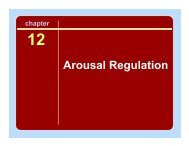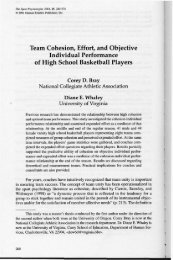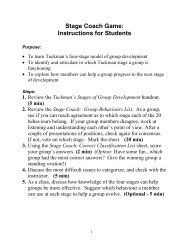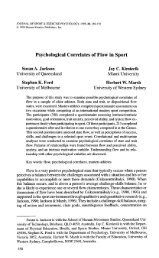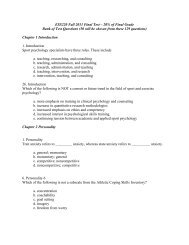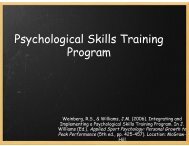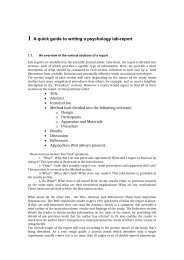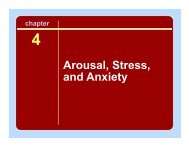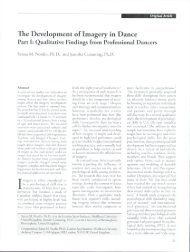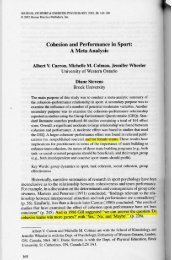Sport and Exercise Psychology Review - Sport Psychology Goes to ...
Sport and Exercise Psychology Review - Sport Psychology Goes to ...
Sport and Exercise Psychology Review - Sport Psychology Goes to ...
You also want an ePaper? Increase the reach of your titles
YUMPU automatically turns print PDFs into web optimized ePapers that Google loves.
Challenges for the Division of <strong>Sport</strong> & <strong>Exercise</strong><br />
org.uk/careers/accredited-courses). Each<br />
solution, however, requires students <strong>to</strong> invest<br />
additional time <strong>and</strong> money, <strong>and</strong> they might<br />
have <strong>to</strong> complete a lengthy education for<br />
entry in<strong>to</strong> a profession that has limited job<br />
opportunities. As an additional issue, if students<br />
want <strong>to</strong> gain a BPS accredited MSc that<br />
will contribute <strong>to</strong>wards chartered status, then<br />
they need <strong>to</strong> have their GBR at the outset. If<br />
they don’t have GBR then they can still complete<br />
the degree but it will not contribute<br />
<strong>to</strong>wards registration. It seems inequitable <strong>to</strong><br />
us that students who have completed the<br />
same course are treated differently. Possible<br />
solutions <strong>to</strong> these issues might include<br />
(a) restricting entrance on<strong>to</strong> BPS accredited<br />
MSc courses <strong>to</strong> students with their GBR,<br />
(b) allowing undergraduate students on<br />
sport science degrees opportunities <strong>to</strong> complete<br />
joint honours degree in sport science<br />
<strong>and</strong> psychology, <strong>and</strong> (c) including the GBR<br />
as part of an extended MSc. Also, advertising<br />
the requirements for chartered psychologist<br />
status may help some students <strong>to</strong> plan their<br />
studies earlier.<br />
Continuing Professional Development<br />
Anderson <strong>and</strong> Lavallee did not consider<br />
supervision under their Continued Professional<br />
Development heading, but did discuss the<br />
<strong>to</strong>pic under the heading Practical Experience<br />
<strong>and</strong> Supervision. We suggest that supervision<br />
should be part of a continuing professional<br />
development scheme. Often continued professional<br />
development consists of workshops<br />
<strong>and</strong> courses. Counsellors <strong>and</strong> therapists of<br />
various persuasions, however, have indicated<br />
that supervision was more helpful <strong>to</strong> their<br />
career development than taking workshops<br />
<strong>and</strong> courses (Orlinsky et al., 2001). Anderson<br />
<strong>and</strong> Lavallee mentioned some issues that<br />
have <strong>to</strong> be addressed, such as payment <strong>and</strong><br />
supervisor training, <strong>and</strong> considerable<br />
thought will help identify ways <strong>to</strong> resolve<br />
these matters. Potentially, the benefits of<br />
continued supervision make attempts <strong>to</strong><br />
resolve issues worth pursuing. For example,<br />
the use of group <strong>and</strong> collegial supervision<br />
might help keep costs <strong>to</strong> a minimum.<br />
Practical experience <strong>and</strong> supervision<br />
In general, supervision in sport <strong>and</strong> exercise<br />
psychology is an area that deserves more<br />
attention from researchers <strong>and</strong> practitioners<br />
(Andersen, 2004). Although, for example,<br />
supervised work experience might be considered<br />
a central component of training, the<br />
quality as well as quantity of supervision warrants<br />
consideration. For example, specifying<br />
a minimum number of hours may not guarantee<br />
that optimal supervision takes place<br />
(see Tod, Marchant & Andersen, 2004).<br />
Barney, Andersen <strong>and</strong> Riggs (1996) proposed<br />
a model of supervisor training in sport<br />
<strong>and</strong> exercise psychology that might help<br />
inform debate within the British sport <strong>and</strong><br />
exercise psychology community. The model<br />
focused on advanced students supervising<br />
beginning students, while receiving peer<br />
supervision from classmates <strong>and</strong> meta-supervision<br />
from professional elders.<br />
Anderson <strong>and</strong> Lavallee raised the issue of<br />
allowing students <strong>to</strong> gain supervised practical<br />
experience from outside sport. Providing<br />
opportunities for students <strong>to</strong> work in settings<br />
other than sport <strong>and</strong> exercise may help them<br />
develop competencies that assist them in<br />
obtaining employment after graduation. A<br />
broad interpretation of sport <strong>and</strong> exercise<br />
may allow students <strong>to</strong> complete placements<br />
in a variety of contexts, including medical<br />
<strong>and</strong> rehabilitation settings.<br />
Anderson <strong>and</strong> Lavallee provided a valuable<br />
contribution <strong>to</strong> the literature on sport<br />
<strong>and</strong> exercise psychology training <strong>and</strong> registration<br />
in Britain. There is much <strong>to</strong> be<br />
learned from examining the ways that other<br />
organisations have dealt with training <strong>and</strong><br />
registration. In addition <strong>to</strong> the APS <strong>and</strong> APA,<br />
examining the ways training <strong>and</strong> registration<br />
have been approached by other organisations<br />
may prove beneficial. It might be<br />
worth examining the Association for the<br />
Advancement of Applied <strong>Sport</strong> <strong>Psychology</strong>’s<br />
(AAASP) certified consultant scheme<br />
(see www.aaasponline.org/cc). For example,<br />
reviewing AAASP’s gr<strong>and</strong>parenting procedures<br />
for individuals who achieved their doc<strong>to</strong>ral<br />
degrees prior <strong>to</strong> 1992 might help the<br />
<strong>Sport</strong> & <strong>Exercise</strong> <strong>Psychology</strong> <strong>Review</strong> Vol 1 No 2 51



